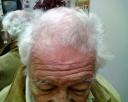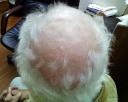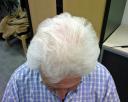FDA CLEARS THE HAIRMAX LASERCOMB FOR THE PROMOTION OF HAIR GROWTH
31.01.2008 in UncategorizedBOCA RATON, FL, February 2007 – Lexington International LLC is proud to announce the landmark achievement of US Food & Drug Administration (FDA) clearance for their medical laser device, the HairMax LaserComb®. Through years of extensive research and clinical studies in the science of hair growth, Lexington has developed an affordable and convenient, hand-held laser device, now clinically proven to promote hair growth in males with androgenetic alopecia (Norwood IIA to V with Fitzpatrick skin types I to IV).
To view FDA’s public record of this clearance visit www.fda.gov/cdrh/pdf6/K060305.pdf.
This FDA clearance of the HairMax LaserComb offers an exciting new modality for the promotion of hair growth in males. Until now, the FDA has only approved two other products as solutions to combat hair loss, a condition that affects approximately 55 million men in the U.S. But the HairMax LaserComb stands out as the only proven drug-free alternative. This gives many hair loss sufferers, previously unable or unwilling to turn to drug-based solutions, newfound hope in their battle. Fortunately, treatments using the HairMax LaserComb are easy to administer, only 10 to 15 minutes three times per week, and the laser device is convenient to use in the comfort and privacy of your own home.
For the FDA submission, Lexington conducted an extensive clinical study in four different locations across the United States. The study concluded that 93% of the participants (ages 30-60) using the HairMax LaserComb had an increase in the number of terminal (thick) hairs. The average number of terminal hairs per square centimeter increased by 19 hairs/cm² over a six-month period. During the study, there were no reports of serious adverse events. The number and types of adverse events were similar in both the active and placebo groups.
Lexington’s clinical study investigating the efficacy of the HairMax LaserComb in females is concluding and they will be submitting the data to the FDA shortly.
David Michaels, Managing Director, shares his thoughts on this momentous announcement, “We are very excited that we have reached a major milestone in hair care and science. Laser hair therapy is the talk of the hair restoration industry today. And not only were the results of this study extremely significant, but with the credibility of the FDA clearance, we are soundly positioned to make a substantial impact in the emerging hair restoration industry.”
Dr. Matt Leavitt, Chief Medical Advisor to Lexington, expresses his enthusiasm on news of the FDA clearance, “The HairMax LaserComb is a method of treatment that can be of great help to men of all ages suffering from hair loss. I am impressed with the protocol and results from the clinical trials that Lexington has conducted. With the FDA clearing the HairMax LaserComb as a medical device, it offers an attractive option for hair growth for medical practitioners. We can now deliver a new modality to our patients and achieve strong user satisfaction.”
Randy Veliky, Lexington COO, concludes, “The HairMax LaserComb will revolutionize the hair growth industry, but we are not stopping there. Lexington is dedicated to continuing research into laser technology. We will be expanding our offering of laser hair growth solutions to include freestanding clinical units, affordable laser panel arrays for the home market and broadening the features of our current products.”
For over 20 years, the directors of Lexington have been at the forefront of laser hair growth research. Born from this passion for innovation, The HairMax LaserComb uses a patented technology to part the hair allowing the focused laser energy to reach the scalp. The laser is most effective when it has an unobstructed path directly to the hair follicle. Through extensive research, Lexington has determined the optimal wavelength and energy level needed to deliver maximum results. Lexington’s continued dedication to consistent innovation ensures that users are always receiving the latest in laser hair technology.
Do you have Hair Loss Problems, read our Hair Loss Help
no comment













